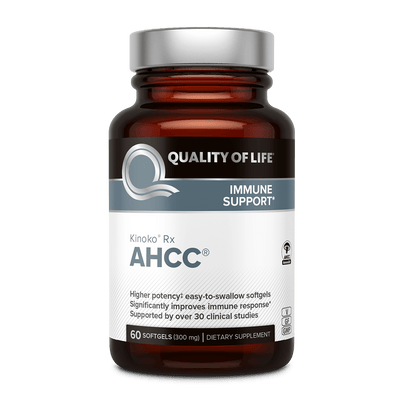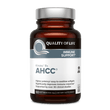Benefits
- Significantly improves immune response*
- Strengthens resistance*
- Maintains peak natural killer cell and T-cell activity*
- Promotes optimal macrophage activity*
- Increases dendritic cell numbers and activity*
Highlights
- Cultured extract of medicinal mushroom mycelia (roots)
- Each 300-mg softgel of concentrated AHCC® is equivalent to one 500-mg capsule of regular AHCC®
- Supported by over 30 human studies conducted at top-tier universities and used in 1,000+ clinics worldwide
- Low molecular weight (5,000 daltons) for enhanced absorption and efficacy
- 2 easy-to-swallow softgels support everyday immune maintenance*
CLINICAL RESEARCH
Many people turn to alternative and complementary therapies to boost their immune systems. But with so many different choices, all claiming to be the best, it can be hard to separate the scientifically validated products from the fads. AHCC® makes it easy.
AHCC® is an extensively studied, highly efficacious, 100% natural supplement for bolstering immunity.* A proprietary extract of hybridized medicinal mushroom mycelia (roots), AHCC® is:
- Supported by over 30 human clinical trials, as well as over 100 pre-clinical trials
- Used in over 1,000 clinics worldwide
- Japan’s top-selling immune-supporting specialty dietary supplement
Quality of Life was the first company to introduce AHCC® back in 2002, when it won the prestigious NutrAward for Best New Product of the Year. Since then, it has remained our most popular and highly rated product.
DAILY REGIMEN
Kinoko® Rx AHCC® contains 300 mg of concentrated AHCC®, equivalent to 500 mg of regular AHCC®, in each vegetarian capsule. A two-capsule serving provides 600 mg of concentrated AHCC® (equivalent to 1,000 mg of regular AHCC®) — the recommended dose for everyday immune system maintenance.* Take daily to keep your immune system going strong, and increase the dose when you’re not feeling 100%.*
If you’re looking for an immune system supplement that works, check out the benefits of AHCC® Rx. It’s 100% natural and can help boost your immunity.
-

100%
Gluten-Free -

100%
GMO-Free -

Magnesium
Stearate Free -

100%
Vegetarian -

100%
Dairy free
Loved by 50,000+ Customers
See all our reviews here
Powerful
I have been taking AHCC for 7 months. I can feel my immune system is getting better. It is a great product and I will be keep taking it!
Thomas M.
Love AHCC
No explanation is needed. You will know why it is the best nutritional supplement if you try it.
Kerin B.
Good stuff!
This product is great. I've been using this for months and has helped boost my immune system. It's a bit expensive but I understand why. It works and will be continuing to use this for a while.
Jane L.
Excellent immune builder
I have been taking AHCC this year and it has kept my immune system strong! It is a must have supplement for me!
Sonia S.
Quality Product
I am very impressed not only with this company but also with their high quality products. I don't worry about what I'm putting in my body when I take Quality of Life Products because I know from experience that this company only sells top of the line, high quality products. Thank you
Nancy F.
Great product
I can feel the difference great product.
Julie K.
Powerful
I have been taking AHCC for 7 months. I can feel my immune system is getting better. It is a great product and I will be keep taking it!
Love AHCC
No explanation is needed. You will know why it is the best nutritional supplement if you try it.
Good stuff!
This product is great. I've been using this for months and has helped boost my immune system. It's a bit expensive but I understand why. It works and will be continuing to use this for a while.
Excellent immune builder
I have been taking AHCC this year and it has kept my immune system strong! It is a must have supplement for me!
Quality Product
I am very impressed not only with this company but also with their high quality products. I don't worry about what I'm putting in my body when I take Quality of Life Products because I know from experience that this company only sells top of the line, high quality products. Thank you
Great product
I can feel the difference great product.
Learn more about
our ingredients

AHCC® works as a biological response modifier, which means it turns up the dial on your natural immune response and strengthens your resistance.* It works by increasing the numbers and activity of white blood cells in the body. AHCC® increases the activity of natural killer cells, the body’s first line of defense, by as much as 300-800%.* It boosts populations of macrophages, which engulf and destroy foreign material.* It increases numbers of dendritic cells, which identify immune threats and lead T cells to them.* And it boosts numbers and activity of T cells, which recognize previously encountered immune threats and eliminate them on the spot.*
Click here to view the research abstracts.
100% of our ingredients are backed by human clinical studies.
Click on any of the ingredients below to view the research abstracts.
Suggested Use: 2 softgels (up to 3 times) daily before meal.
| Serving Size: 2 softgels | Serving Per Container: 30 |
| Amount Per Serving | %DV |
|---|---|
| AHCC® FD proprietary blend Mycelia extract of hybridized basidiomycetes (Lentinula edodes) mushrooms (with acetylated alpha-glucans), carnauba plant wax, dextrin (tapioca), cellulose(plant), alpha-cyclodextrin (vegetable) |
600 mg |
| Daily value (DV) not established. |
Other ingredients: soybean oil, soy lecithin, beeswax (yellow), fumed silica, food starch, carrageenan, glycerin, sorbitol, purified water, caramel powder.
Contains Soy.

Dosage Chart
| Ingedients | Daily Dose Used in Human Studies | Daily Dose Used in AHCC® Rx |
|---|---|---|
| AHCC® | 600 mg - 1.8 g AHCC® FD | 600 mg - 1.8 g AHCC® FD |
Serving size: 2 - 6 softgels ● Daily dose: 2 - 6 softgels
Directions for use
| Serving Size | Daily dose | When to take | How to take |
|---|---|---|---|
| 2 Softgels | 2 - 6 Softgels | 2 - 6 Softgels daily | Before meals |
The Most Effective Medicinal Mushroom Product Available
What makes AHCC® so effective? First, it contains a special class of polysaccharides called alpha glucans, which are powerful immune-boosters.* Glucans are common in all medicinal mushrooms, but the alpha glucans in AHCC® are more potent than the beta-glucans found in most other mushrooms. Second, AHCC® solves the principal problem facing most medicinal mushroom supplements: poor absorption. While most medicinal mushroom extracts have a molecular weight of more than 200,000 daltons, AHCC® is manufactured through a patented process that reduces its molecular size to under 5,000 daltons — increasing absorption and enhancing efficacy.
Trust, Efficacy, and Our Promise
We are the only brand in the supplement industry that can guarantee that every single ingredient in every one of our products is backed by human studies and delivered in doses consistent with clinical research
No exceptions, no compromises.
Satisfaction
Guarantee
You can return items purchased directly from Quality of Life Labs for any reason within 30 days of purchase. See our Returns page for full details.
Protectively
Packaged in the USA
We package almost all of our products in glass bottles with metal lids for one simple reason: Glass and metal do the best job of protecting our supplements from light, oxygen, and moisture — all of which can degrade vitamins, minerals, botanicals, and other nutraceuticals and lessen their potency and freshness.
Dosages
Matter
When you choose Quality of Life, you can trust your supplements to work, because 100 percent of the ingredients in every product we manufacture are provided in dosages that match the clinical research.
Frequently Asked Questions
-
What is the difference between the AHCC® used in the AHCC® Rx formula and the AHCC® used in the Kinoko®?
The AHCC® used in AHCC® Rx (called AHCC® FD, previously named AHCC® Pro) has a higher potency than the regular AHCC® used in our other AHCC® products. Each 300 mg softgel of AHCC® Rx is equivalent to one 500 mg capsule of regular AHCC®.
-
If I am allergic to mushrooms can I take AHCC®?
Allergies to mushrooms are most often associated with exposure to mushroom spores. These spores originate in the top of the mushroom, called the fruiting body. However, AHCC® is derived from the mycelia, or the root of the mushroom, which does not contain spores. In addition, as part of the manufacturing process, the raw material is subjected to a fermentation process that breaks down the high molecular weight molecules that are very tough to digest, into low molecular weight compounds. This process further lowers any allergenic potential. Many people who believe they are allergic to mushrooms take AHCC® successfully. However, if you are concerned, please check with a healthcare professional that specializes in natural products or begin taking AHCC® very slowly. This can be done by starting with a quarter of a capsule on the tip of your tongue and if you don't experience itching in your mouth or other signs of allergy, work your way up to 2 to 6 capsules per day over a period of several days.
-
Does AHCC® lose its effectiveness over time?
No AHCC® does not lose its effectiveness overtime. As shown in an AHCC® placebo controlled scientific trial, patients who used AHCC regularly over a ten year period had consistent and significant improvement as compared to the placebo group, therefore showing no signs of the ingredient losing effectiveness.*
-
Can AHCC® be taken with other medications?
Two studies conducted at the highly prestigious MD Anderson Cancer Center and published in the Journal of Integrative Oncology explored AHCC’s interaction with other medications. These studies determined that AHCC is metabolized via a pathway called “P450 2D6,” meaning that AHCC® has the potential to increase or decrease the absorption of a drug that uses the same pathway.
Therefore if you are taking another medication and are concerned about possible interactions, we recommend you ask a medical professional if the drug you are taking is metabolized through the cytochrome P450 2D6 class of enzymes. Most likely the answer will be “no” which means that AHCC® is highly unlikely to interact with the drug you are taking.
Customer Reviews

Quality of Life's Satisfaction Guarantee
You can only return items purchased directly from Quality of Life Labs for any reason within 30 days of purchase. You will receive a full refund for unopened items in the original form of payment and merchandise credit for opened items.
















